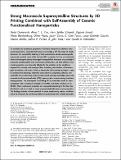Strong Macroscale Supercrystalline Structures by 3D Printing Combined with Self‐Assembly of Ceramic Functionalized Nanoparticles
Author(s)
Domènech, Berta; Tan, Alvin TL; Jelitto, Hans; Zegarra Berodt, Eduardo; Blankenburg, Malte; Focke, Oliver; Cann, Jaclyn; Cem Tasan, C; Colombi Ciacchi, Lucio; Müller, Martin; Furlan, Kaline P; John Hart, A; Schneider, Gerold A; ... Show more Show less
DownloadPublished version (5.243Mb)
Publisher with Creative Commons License
Publisher with Creative Commons License
Creative Commons Attribution
Terms of use
Metadata
Show full item recordAbstract
© 2020 The Authors. Published by WILEY-VCH Verlag GmbH & Co. KGaA, Weinheim To translate the exceptional properties of colloidal nanoparticles (NPs) to macroscale geometries, assembly techniques must bridge a 106-fold range of length. Moreover, for successfully attaining a final mechanically robust nanocomposite macroscale material, some of the intrinsic NPs’ properties have to be maintained while minimizing the density of strength-limiting defects. However, the assembly of nanoscale building blocks into macroscopic dimensions, and their effective macroscale properties, are inherently affected by the precision of the conditions required for assembly and emergent flaws including point defects, dislocations, grain boundaries, and cracks. Herein, a direct-write self-assembly technique is used to construct free-standing, millimeter-scale columns comprising spherical iron oxide NPs (15 nm diameter) surface functionalized with oleic acid (OA), which self-assemble into face-centered cubic (FCC) supercrystals in minutes during the direct-writing process. The subsequent crosslinking of OA molecules results in nanocomposites with a maximum strength of 110 MPa and elastic modulus up to 58 GPa. These mechanical properties are interpreted according to the flaw size distribution and are as high as newly engineered platelet-based nanocomposites. The findings indicate a broad potential to create mechanically robust, multifunctional 3D structures by combining additive manufacturing with colloidal assembly.
Date issued
2020Department
Massachusetts Institute of Technology. Department of Mechanical EngineeringJournal
Advanced Engineering Materials
Publisher
Wiley